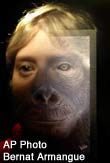Genetic Upper Class: Could the Human Race Split?

Could the human species split in two over time due to evolutionary pressures as predicted by science fiction writer H.G. Wells?
Evolutionary theorist Oliver Curry of the London School of Economics believes it could happen in 100,000 years. I couldn't resist this story, even though Dr. Curry's degree is apparently a Ph.D. "on the evolution of human moral sentiments" rather than in evolutionary genetics.
"Underclass" human beings will have devolved into dim-witted, short, goblin-like creatures.
Chins would recede, as a result of chewing on carefully processed foods. Reliance on medicine would result in weakened immune systems, with genetic weaknesses no longer thrown out of the gene pool. The logical outcome, says Curry, would be two sub-species of human beings; one group gracile (slim and attractive) and the other more robust and physically strong.
The Upper-world people might once have been the favoured aristocracy, and the Morlocks their mechanical servants: but that had long since passed away. The two species that had resulted from the evolution of man were sliding down towards, or had already arrived at, an altogether new relationship. The Eloi, like the Carolingian kings, had decayed to a mere beautiful futility. They still possessed the earth on sufferance: since the Morlocks, subterranean for innumerable generations, had come at last to find the daylit surface intolerable... Ages ago, thousands of generations ago, man had thrust his brother man out of the ease and the sunshine. And now that brother was coming back changed... So, in the end, above ground you must have the Haves, pursuing pleasure and comfort and beauty, and below ground the Have-nots, the Workers getting continually adapted to the conditions of their labour... Such of them as were so constituted as to be miserable and rebellious would die; and, in the end, the balance being permanent, the survivors would become as well adapted to the conditions of underground life, and as happy in their way, as the Upper-world people were to theirs. As it seemed to me, the refined beauty and the etiolated pallor followed naturally enough. ...The too-perfect security of the Upper-worlders had led them to a slow movement of degeneration, to a general dwindling in size, strength, and intelligence. That I could see clearly enough already. What had happened to the Under-grounders I did not yet suspect; but from what I had seen of the Morlocks--that, by the by, was the name by which these creatures were called--I could imagine that the modification of the human type was even far more profound than among the "Eloi," the beautiful race that I already knew. (From The Time Machine [H.G. Wells, 1898])
Wells wrote about what is called "allopatric speciation," in which physically isolated populations no longer interbreed [Editor's note: Darwin wrote of this phenomenon's occurrence in the animal kingdom].
Curry is apparently proposing speciation without geographic isolation—what is called "sympatric speciation." Some scientists reject it outright. One species, the Rhagoletis pomonella maggot, which originally fed on hawthorn fruit, may be undergoing sympatric speciation in this country following the introduction of the apple in North America. Rhagoletis pomonella that feed on apples no longer feed on hawthorn fruit and vice-versa.
Take a look at more of H.G. Wells' ideas and inventions (apparently "torn from today's headlines"). Read a standard example of the story here; Dr. Curry's remarks were prepared for and delivered on the 21st anniversary of Bravo, a men's television channel.
Get the world’s most fascinating discoveries delivered straight to your inbox.
(This Science Fiction in the News story used with permission from Technovelgy.com
- Life's Little Mysteries
- Humans Strange, Neanderthals Normal
- Darwin's Natural Selection Still at Work in Humans


